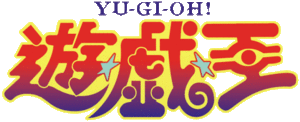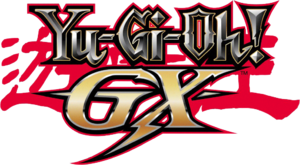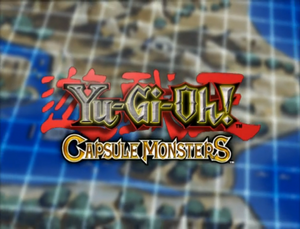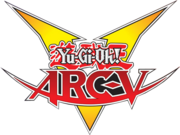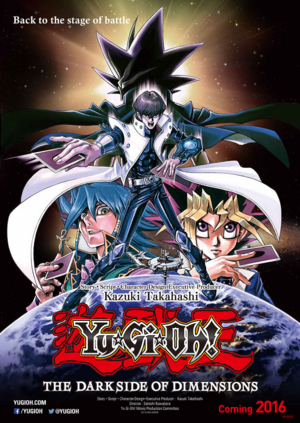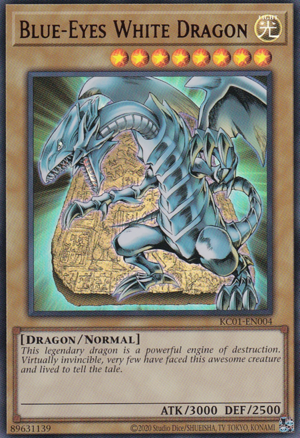Yu-Gi-Oh!
| Yu-Gi-Oh! | |||
|---|---|---|---|
|
Yu-Gi-Oh!遊☆戯☆王Yūgiō | |||
|
Manga Series | |||
| Authored by | |||
| Publisher | |||
| |||
| Serialized in |
| ||
| Original run |
September 30, 1996 – March 8, 2004 | ||
| No. of volumes |
38 | ||
| Anime series: Yu-Gi-Oh! | |||
| Directed by | |||
| Studio | |||
| Network | |||
| Original run |
April 4, 1998 — October 10, 1999 | ||
| No. of episodes | |||
| Anime series: Yu-Gi-Oh! | |||
| Directed by | |||
| Studio |
Studio Gallop, Nihon Ad Systems | ||
| Network | |||
| |||
| Original run |
April 18, 2000 — September 29, 2004 | ||
| No. of episodes |
224 | ||
| Anime films: Yu-Gi-Oh! | |||
| Produced by |
Toei Animation | ||
| Release date |
March 6, 1999 | ||
| Runtime |
30 mins | ||
| Anime films: Yu-Gi-Oh! The Movie: Pyramid of Light | |||
| Produced by |
Michael Pecerlello | ||
| Music by | |||
| Studio |
| ||
| licensor | |||
| Release date | |||
| Runtime | |||
| Anime films: Yu-Gi-Oh! 3D Bonds Beyond Time | |||
| Produced by |
| ||
| Music by |
| ||
| Studio |
Studio Gallop | ||
| Release date | |||
| Runtime | |||
| Anime films: Yu-Gi-Oh! The Dark Side of Dimensions | |||
| Produced by |
Teruaki Jitsumatsu | ||
| Music by |
Yoshihiro Ike | ||
| Studio |
Studio Gallop | ||
| Release date | |||
| Runtime |
130 minutes | ||
| |||
| Wikipedia has a page about Yu-Gi-Oh!. |
Yu-Gi-Oh! (遊☆戯☆王 Yūgiō, Japanese for "King of Games") is a franchise that began in 1996 as a manga series by Kazuki Takahashi. Despite the manga's roots focusing on variety of different games, the franchise is largely centered around one card game featured in the series and involves real-world versions of the card game and numerous manga and anime series, in which it is played.
The card game involves players assembling Decks of Monster, Spell, and Trap Cards that they use to battle each other. It is known in-series as Magic & Wizards and later Duel Monsters. The real-world games are called the Yu-Gi-Oh! Official Card Game and Yu-Gi-Oh! Trading Card Game. Numerous other real-world and video-game variations also exist.
The series plot focused on Yugi Mutou, who would unknowingly become possessed by Dark Yugi and defeat wrongdoers in Shadow Games, usually a different game each week. Due to viewer interest, Duel Monsters become the main game and multiple-chapter arcs replaced the episodic nature. Two anime series were based on the plot of the original manga. Since their conclusion, numerous spin-off series, featuring new main characters and stories involving the card game were also released.
Contents
Composition[edit]
The Yu-Gi-Oh! universe currently consists of nine manga series, nine anime series, and four films.
Manga[edit]
Yu-Gi-Oh! (original manga)[edit]
The Yu-Gi-Oh! (遊☆戯☆王, Yūgiō?) manga ran from 1996 to March 8, 2004. It was created by Kazuki Takahashi, and was one of the most popular titles featured in Shueisha's Weekly Shōnen Jump. The manga initially focuses on Yugi Mutou, as he faces villains in various games. Yugi also gets into misadventures with his friends Katsuya Jonouchi, Anzu Mazaki and Hiroto Honda. The plot starts out fairly episodic and includes only three instances of Magic and Wizards in the first seven volumes. In the eighth volume, the Duelist Kingdom arc starts, making the plot shift to a Duel Monsters-centered universe.
The editors were Yoshihisa Heishi and Hisao Shimada. Kazuki Takahashi credits Toshimasa Takahashi in the "Special Thanks" column.
The English version of the Yu-Gi-Oh! manga is released in the United States and Canada by Viz Media in both the Shonen Jump magazine and in individual graphic novels. The original Japanese character names are kept for most of the characters (Yugi, Jonouchi, Anzu, and Honda, for instance), while the English names are used for a minor number of characters (e.g. Maximillion Pegasus) and for the Duel Monsters cards. It is published in its original right-to-left format, and the manga is largely unedited.
The translators of the English manga are Anita Sengupta (for volumes 1-7, and Duelist 1) and Joe Yamazaki (for Duelist 2-24 and Millennium World). Some content was revised in later printings of earlier volumes.
Viz released volumes 1 through 7 of the Yu-Gi-Oh! manga under its original title. The Duelist Kingdom and Battle City arcs are released under the title; Yu-Gi-Oh!: Duelist, while the Egypt arc was released as Yu-Gi-Oh! Millennium World. As of the December 2007 issue, the series has come to a close, after a long five year run in the pages of Shonen Jump, America.
Yu-Gi-Oh! R[edit]
Yu-Gi-Oh R (遊☆戯☆王 R, Yūgiō Āru?) is illustrated by Akira Ito, one of the artists who illustrated the original Yu-Gi-Oh! manga, and supervised by Takahashi. Yu-Gi-Oh! R is a spin-off of the original Yu-Gi-Oh! franchise, with most of the same characters in a new plotline (which takes place between the Battle City story arc and the Millenium World story arc). The manga was first published in Shueisha's monthly magazine V-Jump on April 21, 2004.
Yu-Gi-Oh! GX[edit]
The Yu-Gi-Oh! GX (遊☆戯☆王 GX, Yūgiō Jī Ekkusu?) manga series is a manga adaptation of the Yu-Gi-Oh! GX television series. The comic is illustrated by Naoyuki Kageyama and differs from the anime, featuring new storylines and monsters, as well as some personality changes in some of the characters.
The Yu-Gi-Oh! GX manga series was released in North America by Viz Media. It has been serialized in the manga magazine Shonen Jump, beginning in January 2007. Unlike the other manga serialized in the magazine, one chapter of the manga is printed per issue. Unlike the English-language editions of the original manga series, the English-language Yu-Gi-Oh! GX manga uses the English-language anime names created by 4Kids Entertainment. The GX episodes are rated 11+.
Yu-Gi-Oh! 5D's[edit]
A Yu-Gi-Oh! 5D's (遊☆戯☆王 5D's, Yūgiō Faibu Dīzu) manga began serialization in V-Jump Monthly Magazine from August 2009. It is written by Masahiro Hikokubo and Satou Masashi and, like the GX manga, features different storylines and monsters.
Yu-Gi-Oh! ZEXAL[edit]
A Yu-Gi-Oh! ZEXAL (遊戯王 ZEXAL, Yūgiō Zearu) manga began serialization in V-Jump Monthly Magazine December 18, 2010, before its anime counterpart debuted. The beginning of the manga contains the same events as the anime, but the story starts to diverge in Rank 10, leading to a completely different storyline. The series is written by Shin Yoshida, illustrated by Naohito Miyoshi and published by Shueisha. Kazuki Takahashi also supervises the series.
Yu-Gi-Oh! ARC-V[edit]
A Yu-Gi-Oh! ARC-V (遊☆戯☆王ARC-Ⅴ, Yūgiō Āku Faibu) manga began serialization in V-Jump Monthly Magazine August 20, 2015. The series is written by Shin Yoshida, illustrated by Naohito Miyoshi and published by Shueisha, while the Duels are written by Masahiro Hikokubo and Kazuki Takahashi supervises the series. Like the GX and 5D's manga, the characters' personalities differ from the anime and the storyline and monsters are different.
Yu-Gi-Oh! OCG Structures[edit]
The Yu-Gi-Oh! OCG Structures (
Yu-Gi-Oh! SEVENS Luke! Explosive Supremacy Legend!![edit]
A Yu-Gi-Oh! SEVENS (
Yu-Gi-Oh! GO RUSH!![edit]
A Yu-Gi-Oh! GO RUSH!! manga began serialization in Saikyō Jump April 4, 2022. The series is written and illustrated by Sugita Naoya and appears to return to the formula set by previous manga series, starring Yudias Velgear.
Anime[edit]
Yu-Gi-Oh! (Toei anime)[edit]
Yu-Gi-Oh is a 27-episode anime series based on volumes 1-7 of the Yu-Gi-Oh! manga that was produced by Toei Animation. The adapted manga volumes do not prominently feature Magic & Wizards (known as Duel Monsters in the anime). It aired on TV Asahi, running from April 4, 1998 until October 10, 1998. It has never been released outside of Japan.
Yu-Gi-Oh! Duel Monsters[edit]
Yu-Gi-Oh!, known in Japan as Yu-Gi-Oh! Duel Monsters (遊☆戯☆王 デュエルモンスターズ Yūgiō Dyueru Monsutāzu), is an anime adaptation of the Yu-Gi-Oh! manga that was produced by Nihon Ad Systems.
In Japan, it aired on TV Tokyo, running for 224 episodes from April 18, 2000 until September 29, 2004. It was later translated into more than 20 languages and aired in more than 60 countries. In the West, 4Kids and Warner Bros. produced the English adaptation under the title Yu-Gi-Oh!; it aired as five seasons from September 29, 2001 until June 10, 2006.
For the most part, this anime series is based on the manga from Volume 8 onward; however, it also has some content from Volumes 4 and 5, in an abbreviated form.
Yu-Gi-Oh! GX[edit]
Yu-Gi-Oh! GX is an original spin-off anime series that follows new protagonist Jaden Yuki (Judai Yuki) throughout his time at Duel Academy. It is set a few years after the events of the previous series. In Japan, it ran for 180 episodes from October 6, 2004 to March 26, 2008; in the dub, it ran for 155 episodes from 10 October 2005 to 12 July 2008.
In the West, it was localized by 4Kids Entertainment. It prominently featured Fusion Monsters and has been heavily associated with them since.
Yu-Gi-Oh! Capsule Monsters[edit]
Yu-Gi-Oh! Capsule Monsters (遊☆戯☆王 カプセルモンスターズ Yūgiō: Kapuseru Monsutāzu) is an original twelve-episode anime commissioned, produced and edited by 4Kids Entertainment. It features the main cast from the original Yu-Gi-Oh! Duel Monsters anime, being set before the end of that series. In the United States, it ran from September 9, 2006 to November 25, 2006. It has not been released in Japan.
Yugi (Yūgi), Joey (Jōnouchi), Téa (Anzu), Tristan (Honda) and Yugi's grandfather Solomon (Sugoroku) are pulled into a world where Duel Monsters are real. They find monster capsules that they can use to summon monsters. Despite its name, it does not have much in common with the Capsule Monster Chess game featured in the Yu-Gi-Oh! manga.
Yu-Gi-Oh! 5D's[edit]
Yu-Gi-Oh! 5D's (遊☆戯☆王 5D's Yūgiō Faibu Dīzu) is an original spin-off anime series that follows new protagonist Yusei Fudo. The five Signer Dragons (the 5D's) are central to the plot—when brought together, they will revive the Crimson Dragon. In Japan, it ran for 154 episodes from April 2, 2008 until March 30, 2011; in the dub, it ran for 123 episodes from September 13, 2008 until September 10, 2011.
The series features a new type of Dueling called Turbo Dueling, where the Duel is conducted while the Duelists are driving motorcycles called Duel Runners. A new type of monster, Synchro Monsters, are introduced and featured prominently throughout the series.
Yu-Gi-Oh! ZEXAL[edit]
Yu-Gi-Oh! ZEXAL is an original spin-off anime series that follows new protagonist Yuma Tsukumo. Yuma works with the spirit Astral to gather the scattered and dangerous "Number" cards, which are the missing pieces of Astral's memory. In Japan, it ran from April 11, 2011 until March 23, 2014; in the dub, it ran from October 15, 2011 until February 22, 2015. It has 146 episodes.
This series introduces and prominently features Xyz Monsters.
Yu-Gi-Oh! ARC-V[edit]
Yu-Gi-Oh! ARC-V (read as "Arc Five") is an original spin-off anime series that follows new protagonist Yuya Sakaki. In Japan, it ran from April 6, 2014 until March 26, 2017; in the dub, it ran from July 24, 2015 until May 5, 2018. It has 148 episodes.
This series introduces and prominently features Pendulum Monsters. However, unlike previous spin-off series, it also prominently features the signature monster card types of previous series (Fusion, Synchro, and Xyz).
Yu-Gi-Oh! VRAINS[edit]
Yu-Gi-Oh! VRAINS is an original spin-off anime series that follows new protagonist Yusaku Fujiki. In Japan, it ran from May 10, 2017 until September 25, 2019; the dub began airing on September 1, 2018. It has 120 episodes.
This series introduces and prominently features Link Monsters, but from the second season onwards also included the older Summoning mechanics, with the exception of Pendulum Summoning.
Yu-Gi-Oh! SEVENS[edit]
Yu-Gi-Oh! SEVENS is an original spin-off anime series that follows new protagonist Yuga Ohdo. In Japan, it began airing on April 4, 2020 until March 27, 2022 with 92 episodes. There is currently no announced Western release date, but the series' title has been trademarked in the USA and Italy and it was confirmed to be in development for a dub during a reunion panel for the original English voice cast for Yu-Gi-Oh!.[2]
This series features Rush Duels, a new type of Dueling with simplified mechanics. The Yu-Gi-Oh! Rush Duel product line was released in Japan alongside the series, which uses different cards and slightly different rules to the OCG. During its second arc, the series also introduced a new form of Summoning; Maximum Summoning.
During its second season, the series re-introduces Fusion Summoning to Rush Duels, albeit it's named differently and has a different take on the Summon.
Yu-Gi-Oh! GO RUSH!![edit]
Yu-Gi-Oh! GO RUSH!! is an original spin-off anime series that follows new protagonist Yudias Velgear and wil begin airing in Japan on April 3, 2022.
Like its predecessor, Yu-Gi-Oh! SEVENS, this series features Rush Duels. It appears to be directly linked to events from SEVENS, the first spin-off series to do so since Yu-Gi-Oh! 5D's. During its second arc, the series re-introduces Equip Spell Cards to Rush Duels.
Films[edit]
Yu-Gi-Oh! (Toei film)[edit]
The first film of the series was simply titled Yu-Gi-Oh! and was released only in Japan. A thirty-minute film produced by Toei Animation, it was first shown in theaters on March 6, 1999. Its characters are from the Toei Yu-Gi-Oh! anime.
The film is about a boy named Shōgo, who is too timid to duel, even after he got a powerful rare card, the legendary "Red-Eyes Black Dragon", in his Deck. Yugi tries to bring Shōgo's courage out in a Duel with Seto Kaiba, who has his eyes on Shōgo's rare card.
Yu-Gi-Oh! The Movie: Pyramid of Light[edit]
Yu-Gi-Oh! The Movie: Pyramid of Light, often referred to as simply Yu-Gi-Oh! The Movie, is a film developed by 4Kids specifically for Western audiences, based on the Yu-Gi-Oh! anime. Anubis serves as the film's antagonist.
It premiered in the United States on August 13, 2004. The extended uncut Japanese version of the film premiered in special screenings in Japan on November 3, 2004 under the title Yu-Gi-Oh! Duel Monsters: Pyramid of Light. The film was then aired on TV Tokyo on January 2, 2005, and was released on DVD in Japan on 16 March 2005.
Yu-Gi-Oh! 3D Bonds Beyond Time[edit]
Yu-Gi-Oh! 3D Bonds Beyond Time, known in Japan as Yu-Gi-Oh! Movie: Super Fusion! Bonds that Transcend Time, is a 3D film released to celebrate the 10th anniversary of the NAS anime. It premiered in Japan on January 23, 2010 and in North America on February 26, 2011.
It stars the three protagonists of Yu-Gi-Oh!, Yu-Gi-Oh! GX and Yu-Gi-Oh! 5D's: Yugi Muto, Jaden Yuki, and Yusei Fudo. The protagonists fight against Paradox.
Yu-Gi-Oh! The Dark Side of Dimensions[edit]
Yu-Gi-Oh! The Dark Side of Dimensions is a movie featuring the cast of the Yu-Gi-Oh! Duel Monsters. It premiered in Japan on April 23, 2016 and in the United States on January 27, 2017.
It is set in the manga continuity rather than the anime continuity. It occurs some time after the end of the manga. Seto Kaiba attempts to get a rematch with Yami Yugi, but Aigami of the Plana interferes.
Characters[edit]
The main characters of Yu-Gi-Oh! (and Yu-Gi-Oh! Duel Monsters) are Yugi Mutou (spelled Yugi Muto in the English anime), a shy, pure-hearted high school student and gaming expert who possesses an ancient Egyptian relic called the Millennium Puzzle. Another character is named the Nameless Pharaoh or Yami Yugi (also known as Dark Yugi, "the other Yugi" and eventually "Atem"; the latter is his real name, revealed only near the end of the series), a darker personality held in the Millennium Puzzle. Yugi's best friends, Katsuya Jonouchi (Joey Wheeler in the English-language anime versions), Anzu Mazaki (Téa Gardner) and Hiroto Honda (Tristan Taylor) are also primary characters, as well as Yugi's main rival, Seto Kaiba.
The main character of Yu-Gi-Oh! GX is Jaden Yuki (Judai Yuki in the Japanese versions), an energetic boy who possesses great talents in Duel Monsters. He can also communicate with the spirits of certain cards. Jaden attends a special academy to study how to play Duel Monsters. Jaden combats various opponents who seek to control/destroy the world, battling the Sacred Beast cards, the Society of Light, Nightshroud, and The Supreme King (who Jaden later turns into himself). While Jaden is a poor student, his Dueling aptitude is regarded as the best in the whole school, despite his grades and Dorm Rank. He has had rivalries with many of the other Duelists attending there, including Chazz Princeton, Zane Truesdale, Bastion Misawa, and Vellian Crowler.
The main character of Yu-Gi-Oh! 5D's is Satellite resident Yusei Fudo, a genius mechanic, adept Duelist, and Signer. His rival is another Signer named Jack Atlas, who betrayed Yusei and his friends in order to get out of Satellite. Other important characters are Akiza, another Signer and Duelist with psychic powers, the twin siblings Luna and Leo, and Crow Hogan. Yusei and his fellow Signers battle the Dark Signers, the Earthbound Immortals, Yliaster's Three Emperors, and finally their leader Z-one.
All three of these Duelists teamed up in Bonds Beyond Time to battle Paradox, a time traveling agent sent by Z-one in an effort to change the future of the world and save it from destruction by destroying the card game in the past.
The Duel Monsters themselves (as the primary battle agents in the series' card duels), come into play as characters from time to time, especially Kuriboh, Dark Magician, Dark Magician Girl, Jinzo, and the Ojama Trio. Generally, Duel Monsters like the Egyptian God Cards, the Legendary Dragons, the Sacred Beast Cards, the Neo-Spacians, the Five 'Signer' Dragons of 5Ds, the Earthbound Immortals, Meklord Emperors, the Number Xyz Monsters and the Four Dimensional Dragons are of much greater importance to the various storylines rather than other Duel Monsters.
The main characters of Yu-Gi-Oh! ZEXAL are Yuma Tsukumo, a hot-blooded boy introduced as a notoriously poor Duelist at the beginning of the series who holds a belief that Dueling a person makes them your friend, and Astral, an otherworldly amnesic being whose memories have scattered into the 100 Number cards. The Numbers are also sought by other parties and individuals, including Shark, the skilled number one bully of the school, Kite Tenjo, a Number Hunter working for Dr. Faker, the mysterious Vetrix Family, and the Barians, the sworn enemies of Astral World who drive the search for the Numbers behind the scenes. Behind the actions of the Barians is their deity, Don Thousand.
The main character of Yu-Gi-Oh! ARC-V is Yuya Sakaki, a "Duel-tainer" who acts to entertain the crowd during the new Action Duels. He creates the new Pendulum Summoning method and is soon targeted by those who want access to the cards in addition to being caught up in the interdimensional struggles that he and his childhood friend Zuzu Boyle are linked to. Opposing Professor Leo Akaba is Yuya's rival Declan, who has formed a team of "Lancers" to combat the extradimensional threat, which include Yuya's friend Gong, rival Sylvio, and enigmatic and scarred Shay.
The main characters of Yu-Gi-Oh! VRAINS are Yusaku Fujiki, a victim of a crime known as the "Lost Incident" who seeks revenge against the Knights of Hanoi hacker group for their involvement in the Incident, and Ai, one of the six Ignis, A.I. with free will that are hunted by the Knights of Hanoi. The mysterious Varis and his father Dr. Kogami lead the Knights in their crusade against the Ignis, while Yusaku, known as "Playmaker" in LINK VRAINS, is assisted by Kal Kolter, whose brother Jin was another victim of the Incident. The Celebrity Duelists The Gore and Skye Zaizen/Blue Angel also become involved in the fight against the Knights of Hanoi, while Skye's brother Akira Zaizen is a high-ranking official in SOL Techonologies, the company behind LINK VRAINS. The remaining Ignis and their human partners are slowly drawn into the conflict, as are several Bounty Hunters seeking them for SOL Technologies, including The Shepherd.
The main character of Yu-Gi-Oh! SEVENS is Yuga Ohdo, a young boy who believes the Duels enforced by adults in Goha City are rigid and unfun and seeks to enable people to use his Rush Dueling rules and enjoy them. His antics soon attract a group of unlikely friends; Luke, who wants to become the King of Duels, Gavin Sogetsu, the Goha 7th Elementary Student Council President, and Romin Kassidy, who initially dislikes Dueling, but is drawn into the group to spy on them for her cousin Roa. Opposing them are the omnipresent rulers of Goha City, Goha Enterprises, led by the mysterious Goha President, whose many underlings and supporters also try to eliminate Rush Dueling, including Goha Duel Overseer Nail Saionji and the traditionalist Heavy Cavalry Duel Club, led by Asana Mutsuba, heiress to Mutsuba Heavy Machinery.
The main character of Yu-Gi-Oh! GO RUSH!! is Yudias Velgear, an alien from the Velgear Star Cluster who comes to Earth in the hopes that Rush Dueling can end the war in his home system. He encounters twins Yuhi and Yuamu Ohdo, who run UTS, an alien-hunting company, and is followed to Earth by several other aliens, including his former commanding officer Zwijo. Manabu Sogetsu is from MIK, another alien-detection company, and is partnered with the cat Nyandestar.
Central plots[edit]
Yu-Gi-Oh! tells the tale of Yugi Muto, a high school student who was given the fragmented pieces of an ancient Egyptian artifact, the Millennium Puzzle, by his grandfather. Upon reassembling the Puzzle, he is possessed by another personality who is later revealed to be the spirit of a 3,000-year-old Pharaoh (5,000-years-old in the English anime) called Atem, with no memory of his own time. As the story goes on, the two of them (together with Yugi's friends), try to find the secret of the Pharaoh's lost memories and his name, with the Duel Monsters card game being an ever prevalent backdrop or plot device.
Yu-Gi-Oh! GX, set around ten years after the first series, follows the story of Jaden Yuki (Judai Yuki in the Japanese version), a talented young Duelist who is given the card "Winged Kuriboh" by the now-adult Yugi before Jaden's admission to Duel Academy (Duel Academia in the Japanese version), an elitist boarding school established by Seto Kaiba. Jaden (who receives low marks in his admission tests), is placed in the Slifer Red dormitory (Osiris Red), which is reserved for students with the lowest grades. The story goes on as Jaden faces challenges from different students in Duel Academy. He later finds himself entangled in a conflict related to the hidden secrets of the Academy.
Yu-Gi-Oh! 5D's is set in a distant future where the residents of the poverty-stricken town called Satellite provide the manpower to sustain a utopia called New Domino City (Neo Domino City in the Japanese version), a futuristic version of the fictional Japanese metropolis called Domino City where some of the events of the original Yu-Gi-Oh! took place. The story centers around five characters known as Signers, who have birthmarks bearing one part of a monster called the Crimson Dragon (which saved the world in the past, by sealing demons known as the Earthbound Immortals into the earth as the Nazca Lines). The main character, named Yusei Fudo, is a Signer. Each Signer has a unique dragon monster. In later episodes, they fight Dark Signers — Duelists who try to revive the Earthbound Immortal cards.
Yu-Gi-Oh! ZEXAL is set in a new city, Heartland City, and features far more futuristic technology than seen in 5D's; Duel Disks are now tablet-like devices called D-Pads which link with D-Gazer communicators to display images through Authentic Reality rather than holograms. The story centers around the "Numbers", scattered Xyz Monsters which are also the memories of the mysterious being known as Astral. Astral teams up with amateur Duelist Yuma Tsukumo in order to recover the "Numbers", but other parties are hunting the "Numbers" as well; Kite Tenjo, who works for Dr. Faker, and the Vetrix Family, out for revenge against Dr. Faker as their hunt for "Numbers" brings them into conflict with one another.
Yu-Gi-Oh! ARC-V is set in another new city, Paradise City (Maiami City in the Japanese version), where new Duels called Action Duels are the latest craze. Duel Disks have returned to focusing on holographic technology, but the ARC System used in Action Duels enables Duelists to interact with the holograms with mass. Action Duels involve huge and varied Fields, and contain Action Cards that can aid the flow of a Duel. The primary character is Yuya Sakaki, son of the pioneer of Action Duels and co-developer of the ARC System, Yusho Sakaki, who during a match with the Pro League Champion creates a new Summoning technique; Pendulum Summoning. This newfound Summoning draws the attention of the Leo Corporation's CEO Declan Akaba, while as the Arc League Championship unfolds greater powers involving Fusion, Synchro and Xyz Summoning begin to take hold.
Yu-Gi-Oh! VRAINS is set in Den City, but the action largely takes place in LINK VRAINS; an online world run by SOL Technologies and threatened by the Knights of Hanoi. Yusaku Fujiki, known as Playmaker in LINK VRAINS, battles the Knights in order to avenge his past. The conflict takes a turn when Yusaku captures a sentient A.I. known as an Ignis, who he later names Ai, resulting in Data Storms appearing in LINK VRAINS and allowing Duelists to ride them with Duel Boards for Speed Duels. His possession of Ai attracts the attention of the Knights' leaders, Varis and Dr. Kogami, and of SOL Technologies, all of whom desire to hunt the Ignis for their own reasons and enact various attempts to claim it from Playmaker, including involving LINK VRAINS' popular Celebrity Duelists in their plans.
Yu-Gi-Oh! SEVENS is set in the company town of Goha City, run by Goha Enterprises who control all aspects of the citizens' lives, including Dueling. Main protagonist Yuga Ohdo rebels against Goha Enterprises by uploading his own Duel Monsters rules into everyone's Duel Disks; Rush Dueling, allowing players to Summon an unlimited number of times and draw until they hold five cards at the start of each turn. According to legends pursued by his new friend Luke, this opened a new path that would allow one to become the King of Duels, said to dictate the laws of Dueling. The totalitarian Goha Enterprises view this as a hostile act, and set their sights on eliminating the format.
Yu-Gi-Oh! GO RUSH!! is set in Mutsuba Town, which appears to be named after the Mutsuba family from Yu-Gi-Oh! SEVENS. Main protagonist Yudias Velgear comes to Earth in search of Rush Dueling, believing it can end the war in his home system, while Yuhi Ohdo has been searching for an alien who stole Earthdamar, a mysterious substance, from him. Numerous aliens also come to Earth, where different alien-detection organizations exist, including UTS, run by Yuhi and his twin sister Yuamu, and MIK, which Manabu Sogetsu and Nyandestar work for.
The early chapters of Yu-Gi-Oh! feature a variety of different games; but from the Duelist Kingdom arc onwards, the focus is shifted to a card game called Duel Monsters. Duel Monsters is played using a holographic image system created by Seto Kaiba (following his first match with Yugi). In the manga and Toei anime, these were initially performed on tables, using holographic tubes, while the second series anime uses huge holographic arenas. Starting with the Battle City arc, (as well as the series that followed), Duels are performed using portable Duel Disks, invented by Seto Kaiba, which allows Duels to happen anywhere.
Original games[edit]
There are several games in the Yu-Gi-Oh! anime and manga that were originally created as fictitious games for the series and was later turned into real games or video games.
Card game[edit]
The Yu-Gi-Oh! anime and manga series introduces an original card game created by Takahashi. Different names can be used to refer to the game depending on where it appears:
- Magic & Wizards (M&W) — the original name of the card game, used in the original Yu-Gi-Oh! (Japanese and English versions) manga, Yu-Gi-Oh! R and in the Japanese version of Yu-Gi-Oh! GX. In the case of the English manga, the game is renamed Duel Monsters in later-released chapters.
- Duel Monsters — used in Toei Animation's Yu-Gi-Oh! anime, the second series Yu-Gi-Oh! anime (Japanese and English versions), manga (English version only), and film. The name is introduced to replace Magic & Wizards, probably due to its similarity to Magic: The Gathering.
- Yu-Gi-Oh! Official Card Game: Duel Monsters (Yu-Gi-Oh! OCG) — the original name of the real Yu-Gi-Oh! card game released by Konami, used mostly in Asia.
- Yu-Gi-Oh! Trading Card Game (Yu-Gi-Oh! TCG) — the name used in locations where Upper Deck Entertainment distributed the Yu-Gi-Oh! OCG, whose distribution has since been taken over by Konami.
History[edit]
Designed by Kazuki Takahashi, Magic & Wizards (M&W), is a popular card game worldwide. Compared with its predecessor, M&W was very simple when it was first introduced in the manga: there were only two types of cards (Monster & Magic Cards); the result of a monster battle only relied on the Attack and Defense Points of the monsters and the effects of Magic Cards (which only appeared occasionally). According to the author, the game was designed as such because he felt that the rules of Magic the Gathering were too complicated, and he wanted to create something similar but simpler.
The original plan of Takahashi was to phase out M&W, which took him only one night to design, in just two episodes. After the first appearance of the game in the manga (in Volume 2, Duel 9), the reader response on it was enormous, and Shonen Jump started getting calls from readers who wanted to know more about the game. Takahashi realized that he had hit on something, so he modified the storyline to feature more of the card game. With the advance of the manga, the game continued to evolve, becoming more complicated.
The similarities between the games, of note card design (brown with an oval on back), effects and terminology (discarding, graveyard, sacrifice), usage, and pictures (including occult or religious based icons, alluding to the early days of Magic: The Gathering) are all there. The name of Magic's creator is mirrored through the creator of Duel Monsters, Pegasus J. Crawford (Maximillion Pegasus in the English versions), whom both share the same number of letters.
Official Card Game and Trading Card Game[edit]
Magic & Wizards has been brought to life in four versions, by two different companies. The first version, known as the Carddas version, was first released by Bandai in September 1998. Only three boosters had been released for this version before the license of the card game was sold to Konami later. The game was popular, although it used a simplified and modified version of the gaming rule used in the manga, and is less faithful to the manga compared with Konami's versions of the game.
The second version of the Yu-Gi-Oh! cards was released by Konami on December 16, 1998, included as special pack-in cards in the first Yu-Gi-Oh! video game, Yu-Gi-Oh! Duel Monsters. These cards are not to be mixed up with those of Yu-Gi-Oh! OCG released later by the same company. The two versions are different in terms of design, with the looks of the former closer to those in the manga, to an extent that their effect texts are all directly quoted from the manga. Only 10 cards were released for this version, and Konami didn't have any gaming rules for these cards, as they were intended for collection purpose only. They cannot be used in the later-released Yu-Gi-Oh! OCG.
The third version, Yu-Gi-Oh! OCG, was first released on February 4, 1999, by Konami. The gaming rule of this version is much more sophisticated and mature compared with the Carddas version, while at the same time does a much better job in preserving the style and feeling of M&W. Succeeding the popular Carddas version, Yu-Gi-Oh! OCG was an instant hit. And on March 1, 2002, the English version of the game was brought to the U.S. by Upper Deck Entertainment under the new name, Yu-Gi-Oh! Trading Card Game, with the release of its first set, Legend of Blue-Eyes White Dragon. Later on in the same year (March 19), Konami released its first Yu-Gi-Oh! videogame in the U.S. for Gameboy Color, known as Yu-Gi-Oh! Dark Duel Stories, a translation of Yu-Gi-Oh! Duel Monsters 3: Tri-Holy God Advent.
Currently, Yu-Gi-Oh! OCG/TCG have been released in more than 40 countries.
The fourth version, Yu-Gi-Oh! Rush Duel, was first released on April 2, 2020, by Konami, and is currently exclusive to Japan. In comparison to the OCG and TCG, it uses simplified rules and a different card layout that are intended to be easy to understand. The primary changes are that players can Normal Summon or Set monsters an unlimited number of times, and at the start of each turn, the player draws until they hold five cards. It was released alongside the Yu-Gi-Oh! SEVENS anime series, which also focuses on Rush Dueling, and cannot be used in the Yu-Gi-Oh! OCG.
Other games[edit]
Apart from Magic & Wizards, there are also other games that were originally created as fictitious games for Yu-Gi-Oh! manga and were later turned into video games, the most famous ones being:
- Capsule Monster Chess (Capmon) — a sort of pre-Mage Knight collectible miniatures game. Video game: Capsule Monster Coliseum
- Monster World — a role-playing chess game. Video game: Monster Capsule GB (available in Japanese only)
- Dungeon Dice Monsters (DDM), known in the Japanese manga as Dragons Dice & Dungeons (DDD) — a dungeon crawl boardgame where the tiles are created by unfolding the faces of 6-sided dice. Video game: Dungeon Dice Monsters.
- Capsule Monsters, a board game inspired by the earlier Capsule Monster Chess.
Among the four, Dungeon Dice Monsters and Capsule Monsters have been released as real collectible games, but neither proved popular, and currently no more new figures or cards are released.
On March 29, 2003, Mattel released the English version of the first booster of Dungeon Dice Monsters in America, under the title DragonFlame. But so far, only three of the seven boosters in Japanese version have been released, with the last one released in June 2003.
Mattel also released the Yu-Gi-Oh! Capsule Monsters Collectible Figure Game in North America and Canada, but only produced 1 Booster Pack and a two player Starter Set.
Video games[edit]
All Yu-Gi-Oh! video games are produced by Konami. Their English versions generally use 4Kids' anime names, as opposed to Viz's manga names, which are generally the same as the Japanese ones. At Comic-Con 2006 Konami announced that Yu-Gi-Oh! video games had sold a total of 17.5 million copies worldwide. Each game generally includes a few promotional cards for use in the TCG.
The earliest video games tended to not follow the rules of the TCG/OCG.
Books[edit]
Several books based on the manga and anime have been released inside and outside Japan.
References[edit]
- ↑ nick.de Yu-Gi-Oh! (german)
- ↑ Dunstan, Darren (December 23, 2020). "Yu-Gi-Oh! Duel Monsters Reunion Panel ALL-NEW EXTRA SCENES".
We're still recording VRAINS and we're about to start the next series, Yu-Gi-Oh! SEVENS...coming soon.

